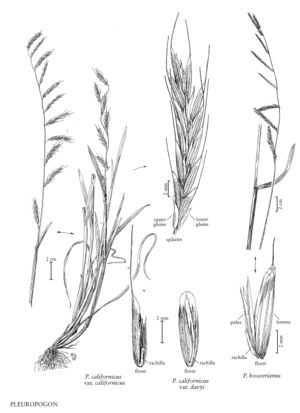Pleuropogon hooverianus
Plants perennial; not cespitose, rhizomatous. Culms 1-1.6 m, erect. Sheaths glabrous, retrorsely scabridulous; ligules 3-6.5 mm; blades 3-30 cm long, 4-10 mm wide, apices acute to acuminate, mucronate, flag leaves often with reduced spinose blades. Racemes 21-33 cm, with 7-10 spikelets; internodes 1.8-8 cm; pedicels 1.5-5 mm, erect or ascending, rarely reflexed. Spikelets 28-42 mm, erect or ascending, with 9-16 florets, usually all but the terminal floret bisexual. Lower glumes 3-5.6 mm; upper glumes 4.5-7.2 mm, 1-3-veined; rachilla internodes 2-3 mm long, about 0.4 mm thick, basal 1/2 developing into a glandular swelling; lemmas 8-9 mm, 7-veined, lateral-veins strongly ribbed, apices toothed, usually rounded, rarely acute or erose, awned, awns 0.2-4 mm; paleal keels unawned, each with a 0.6-1.5 mm triangular appendage; anthers 4-4.8 mm. Caryopses 3.5-4 mm. 2n =16, 36.
Discussion
Pleuropogon hooverianus grows in wet and marshy areas, usually in shady locations. Several of the populations are around redwood groves. It is known only from Mendocino, Sonoma, and Marin counties in California. It is listed as rare by the state of California.
Selected References
None.
Lower Taxa
"decumbent" is not a number.
